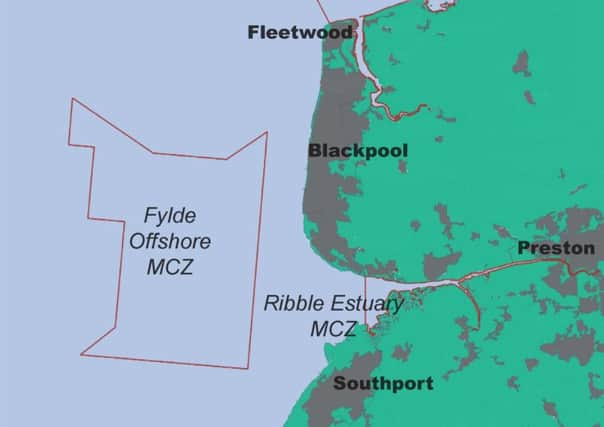Protecting our marine wildlife


The 260km sq section of the Irish Sea, from Bispham to Southport, has been named os one of 27 new marine conservation zones by Defra.
It is hoped the move will protect commercially important species of fish, including sole, plaice and whiting.
Advertisement
Hide AdAdvertisement
Hide AdMarine conservation zones are areas of the sea where human activities are restricted to allow marine life to recover and thrive.


The new conservation zone in Fylde will allow Defra to restrict any activities which are considered to be damaging marine life in the area in the future. It means, for example, fishing regulations or rules governing the number of boats allowed to pass through the area could be changed.
Fylde MP Mark Menzies said: “In Fylde, the importance of protecting our waters is something which we are keenly aware of locally, as many people still rely on the sea for their livelihoods.
“The seabed off the Fylde coast is highly productive and supports an abundance of animals such as crabs, starfish, shrimp-like crustaceans and bivalve shellfish.
Advertisement
Hide AdAdvertisement
Hide Ad“Lytham shrimp are famous around the world and cockling is once again going ahead in a safe and secure manner in the Ribble Estuary, which is to be welcomed.


“The protection of marine life off our coastline is essential and the new Fylde Marine Conservation Zone will help ensure the area is protected from damaging activities to ensure its unique features are conserved.”
Blackpool South MP Gordon Marsden said: “I think this is a very welcome decision, not least because it will help protect some highly sensitive and useful breeding grounds for fish such as plaice and sole, which are very much on the depleted list. It is entirely welcome and should be a very positive thing for the rest of the wildlife on the Fylde coast.”
Nature at sea in ‘shocking’ condition
The Wildlife Trust’s North West marine conservation officer, Emily Baxter, said: “Marine protection is an issue which matters to anyone who has ever spent happy afternoons exploring rock pools, been enchanted by encounters with whales or dolphins or who enjoys eating seafood.
Advertisement
Hide AdAdvertisement
Hide Ad“This is the first active step in what we believe to be the most important action the Government can take to address the shocking state of nature at sea.
“It is critical for the appropriate management of the designated sites to be implemented as soon as possible.
“We were also pleased to hear the government’s commitment to establishing future tranches of MCZs over the coming years.”
Follow us on twitter @The_Gazette and like our page on facebook to keep up with all the latest news.